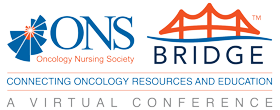|
|
Thursday, June 18, 2020, 5:00 PM – 6:30 PM
Oncology Grand Rounds: Nurse and Physician Investigators Discuss New Agents, Novel Therapies and Actual Cases from Practice — A Complimentary CNE (NCPD) Live Webinar SeriesUrothelial Bladder Carcinoma
  Faculty
Arjun Balar, MD Associate Professor, Department of Medicine Director, Genitourinary Medical Oncology Program NYU Langone Health New York, New York Anastassia Daskalova, NP Genitourinary Medical Oncology Mount Sinai Hospital New York, New York Peter H O’Donnell, MD Associate Professor, Department of Medicine Section of Hematology/Oncology Genitourinary Oncology Program The University of Chicago Chicago, Illinois Susan K Roethke, CRNP, MSN, ANP-BC, AOCNP Genitourinary Medical Oncology Fox Chase Cancer Center Philadelphia, Pennsylvania Moderator Neil Love, MD Research To Practice Miami, Florida Topics for Discussion
Target Audience
USF Health is accredited as a provider of nursing continuing professional development by the American Nurses Credentialing Center’s (ANCC) Commission on Accreditation. A maximum of 1.5 contact hours may be earned by learners who successfully complete this nursing continuing professional development activity. This activity is awarded 1.5 ANCC pharmacotherapeutic contact hours.  Participation Completion Requirements To obtain a certificate of completion and receive credit for this event, nurses must attend the entire activity and return a completed Educational Assessment and Credit Form, which will be emailed to attendees after the event. Oncology Nursing Certification Corporation (ONCC)/Individual Learning Needs Assessment (ILNA) Certification Information The program content has been reviewed by the ONCC and is acceptable for recertification points. Learners must apply for CNE (NCPD) credit to utilize this program for ONCC certification or renewal. http://www.ResearchToPractice.com/Meetings/ONS2020/UrothelialBladderCarcinoma/ILNA Unlabeled/Unapproved Uses Notice There is no implied or real endorsement of any product by USF Health, Research To Practice (RTP) or the ANCC. Any off-label use as declared by the FDA will be identified. Disclosure Policy USF Health adheres to ACCME and ANCC standards regarding commercial support of continuing medical education. It is the policy of USF Health and Research To Practice that the faculty and planning committee disclose real or apparent conflicts of interest relating to the topics of this educational activity, that relevant conflict(s) of interest are resolved and also that speakers will disclose any unlabeled/unapproved use of drug(s) or device(s) during their presentation. FACULTY — Ms Daskalova has no relevant conflicts of interest to disclose. The following faculty (and their spouses/partners) reported relevant conflicts of interest, which have been resolved through a conflict of interest resolution process: Dr Balar — Consulting Agreements: AstraZeneca Pharmaceuticals LP, Genentech, a member of the Roche Group, Janssen Biotech Inc, Merck, Nektar, Pfizer Inc, Seattle Genetics; Contracted Research: AstraZeneca Pharmaceuticals LP, Genentech, a member of the Roche Group, Immunomedics Inc, Janssen Biotech Inc, Merck, Nektar, Pfizer Inc, Seattle Genetics. Dr O’Donnell — Consulting Agreement: Merck; Honoraria: Astellas, Atheneum Partners, FirstWord Publication, Genentech, a member of the Roche Group, Health Advances, Janssen Biotech Inc, Merck, Schlesinger Group, Seattle Genetics, The Dedham Group; Ownership Interest: Allergan, PrescriptIQ; Paid Travel: Astellas, Genentech, a member of the Roche Group, Janssen Biotech Inc, Merck, Seattle Genetics; Other: Janssen Biotech Inc, Nektar, National Institutes of Health. Ms Roethke — Advisory Committee: Astellas; Speakers Bureau: Astellas, Pfizer Inc.MODERATOR — Dr Love is president and CEO of Research To Practice. Research To Practice receives funds in the form of educational grants to develop CME activities from the following commercial interests: AbbVie Inc, Acerta Pharma — A member of the AstraZeneca Group, Adaptive Biotechnologies, Agendia Inc, Agios Pharmaceuticals Inc, Amgen Inc, Array BioPharma Inc, Astellas, AstraZeneca Pharmaceuticals LP, Bayer HealthCare Pharmaceuticals, Biodesix Inc, bioTheranostics Inc, Blueprint Medicines, Boehringer Ingelheim Pharmaceuticals Inc, Boston Biomedical Inc, Bristol-Myers Squibb Company, Celgene Corporation, Clovis Oncology, Daiichi Sankyo Inc, Dendreon Pharmaceuticals Inc, Eisai Inc, EMD Serono Inc, Exelixis Inc, Foundation Medicine, Genentech, a member of the Roche Group, Genmab, Genomic Health Inc, Gilead Sciences Inc, GlaxoSmithKline, Guardant Health, Halozyme Inc, ImmunoGen Inc, Incyte Corporation, Infinity Pharmaceuticals Inc, Ipsen Biopharmaceuticals Inc, Janssen Biotech Inc, administered by Janssen Scientific Affairs LLC, Jazz Pharmaceuticals Inc, Kite, A Gilead Company, Lexicon Pharmaceuticals Inc, Lilly, Loxo Oncology Inc, a wholly owned subsidiary of Eli Lilly & Company, Merck, Merrimack Pharmaceuticals Inc, Myriad Genetic Laboratories Inc, Natera Inc, Novartis, Oncopeptides, Pfizer Inc, Pharmacyclics LLC, an AbbVie Company, Prometheus Laboratories Inc, Puma Biotechnology Inc, Regeneron Pharmaceuticals Inc, Sandoz Inc, a Novartis Division, Sanofi Genzyme, Seattle Genetics, Sirtex Medical Ltd, Spectrum Pharmaceuticals Inc, Taiho Oncology Inc, Takeda Oncology, Tesaro, A GSK Company, Teva Oncology, Tokai Pharmaceuticals Inc and Tolero Pharmaceuticals. USF Health — USF Health CPD staff have no relevant conflicts of interest to disclose.RTP CNE (NCPD) planning committee members, staff and reviewers — Planners, scientific staff and independent reviewers for RTP have no relevant conflicts of interest to disclose. Equal Opportunity Statement USF is an Equal Opportunity/Affirmative Action/Equal Access Institution. Contact Information If you have questions regarding credit, please contact cpdsupport@usf.edu, or call 813-224-7860. Supporters This activity is supported by educational grants from Astellas and Seattle Genetics, Genentech, a member of the Roche Group, Janssen Biotech Inc, administered by Janssen Scientific Affairs LLC, and Merck. |
